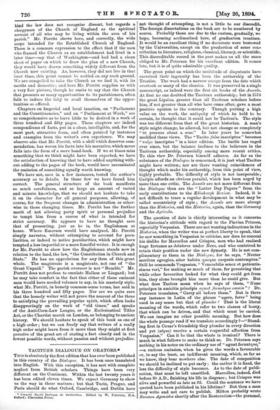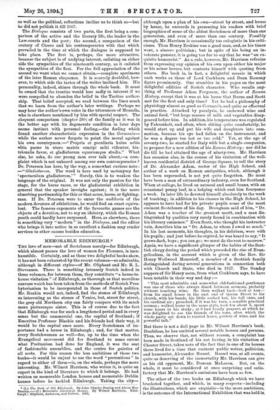TA.CITUS'S DIALOG17E ON ORATORS.*
This is absolutely the first edition that has ever been published in this country of the Dialogue. It has been once translated into English. With this exception, it has met with complete neglect from British scholars. Things have been very different on the Continent. Within the last twenty years it has been edited eleven times. We expect Germany to show us the way in these matters ; but that Turin, Prague, and Paris should do what Oxford, Cambridge, and Dublin have • Cornelii radii Dialogue de Oratoribus. Edited by W. Petersen, KA, Oxford: Clarendon Press.
not thought of attempting, is not a little to our discredit. The foreign dissertations on the book are to be numbered by scores. Probably these are due to the custom, gradually, we hope, becoming acclimatised here, of graduation treatises. It would be an excellent thing if no doctorate were bestowed by the Universities, except on the production of some con. tribution to literature, religious, classical, literary, or scientific. This discreditable record in the past makes us all the more obliged to Mr. Petersen for his excellent edition. It comes late, but it is of quite admirable quality.
The great point on which the multitude of disputants have exercised their ingenuity has been the authorship of the Treatise. The work had a narrow escape from the fate which overtook so many of the classics. It was preserved in a single manuscript, as indeed were the first six books of the Annals.. At first no one doubted the Tacitean authorship ; but in 1574 the great Lipsins, greater than all Tacitean scholars before him, if not greater than all who have come after, gave a most positive opinion to the contrary. Though putting a high value on the work, the antiquity of which he held to be certain, he thought that it could not be Tacitns's. The style was too different from that of the great historian. A man's style might change, he allowed, but not change so completely " nt prorsus abeat a sese." In later years he somewhat modified these views. The " Tacito falso inscriptus " becomes " vulgo inscriptus " in a later edition. The battle has raged ever since, but the balance inclines to the believers in the- Tacitean authorship, especially among more recent critics. To this view Dr. Petersen himself adheres. As far as the substance of the Dialogue is concerned, it is just what Tacitus might have written; nor are there wanting coincidences of thought which make his authorship, from this point of view, highly probable. The difficulty of style is not insuperable, Carlyle affords an obvious parallel, which has been urged by more than one critic. The Annals are not more different from the Dialogue than are the "Latter Day Papers" from the early contributions to the Edinburgh Review. Indeed, it is not difficult to trace a regular development in what may be called eccentricity of style ; the Annals are more abrupt than the Histories, and the Histories, again, than the Germany and the Agricola.
The question of date is chiefly interesting as it concerns. the historian's attitude with regard to the Flavian Princes, especially Vespasian. There are not wanting indications in the Histories, when the writer was at perfect liberty to speak, that he saw something in Vespasian to criticise, nor does he conceal his dislike for Marcellus and Crispns, men who had realised huge fortunes as delatores under Nero, and who contrived to retain their position under the new dynasty. He is not com- plimentary to them in the Dialogue, for he says, "Neuter moribus egregins, alter habitu quoque corporis eonteraptus." Still he commends Vespasian," Venerabilis senex et patientis- simus yeti," for making so much of them, for perceiving that while other favotuites looked for what they could get from him, they alone brought him more than he could give. But what does Tacitus mean when he says of them, " Nunc principes in amicitia principis agun,t feruntgue omnia" ? Dr. Petersen translates, "Carry all before them." But is there any instance in Latin of the phrase " agere, ferre " being used in any sense but that of plunder ? That is the literal meaning of the words, which refer to two classes of booty, that which can be driven, and that which must be carried. We can imagine no other possible meaning. But how does the whole passage read if we translate accordingly ?—" Stand- ing first in Caesar's friendship they plunder in every direction and yet (atgue) receive a certain respectful affection from Vespasian." Can it be that the whole is ironical? There is much in what follows to make us think so. Dr. Petersen says nothing in his notes on the ordinary use of " agunt fernntque," —a curious omission, when he gives the words a favourable or, to say the least, an indifferent meaning, which, as far as we know, they bear nowhere else. The date of composition we should be inclined to put early ; the earlier it is fixed, the leas the difficulty of style becomes. As to the date of publi- cation, that mast be left unsettled. M.arcellus, indeed, died before 80 A.D., finishing his life in disgrace ; but Crispns was alive and powerful as late as 93. Could the sentence we have quoted have been published in his lifetime? But then a man may write and not care to publish. Milton probably wrote Samson Agoniste,s shortly after the Restoration—the personal,
as well as the political; reflections incline us to think so—but he did not publish it till 1667.
The Dialogue consists of two parts, the first being a com- parison of the active and the literary life, the leader in the Law-courts and the poet ; the second, a comparison of the oratory of Cicero and his contemporaries with that which prevailed in the time at which the dialogue is supposed to take place. The first is, perhaps, the more attractive, because the subject is of undying interest, enlisting on either side the sympathies of the nineteenth century, as it enlisted the sympathies of the first. For the full appreciation of the second we want what we cannot obtain,—complete specimens of the later Roman eloquence. It is scarcely doubtful, how- ever, to which aide the tastes of the writer inclined him. His personality, indeed, shines through the whole book. It must be owned that the treatise would lose sadly in interest if we were compelled to abandon the belief in the Tacitus author- ship. That belief accepted, we read between the lines much that we learn from the author's later writings. Perhaps we may hear the author's own voice in the utterances of Messalla, who is elsewhere mentioned by him with special respect. The eloquent comparison (chapter 289) of the family as it was in the better age with its degenerate condition in later days seems instinct with personal feeling,—the feeling which found another characteristic expression in the Germania— while the author never forgets to point the moral against his own countrymen :—" Propria et peculiaria huius urbis vitia paene in utero matris concipi mihi videntur, his- trionalis favor, et gladiator= equornmque studia." What -else, he asks, do our young men ever talk about,—a com- plaint which is not unheard among our own contemporaries P Dr. Petersen has here, by the way, a somewhat curious note : —" Gladiatorum. The word is here used by metonymy for spectaculum gladiatorum.' " Surely, this is to weaken the language of the original. It was not only the passion for the stage, for the horse races, or the gladiatorial exhibition in general that the speaker inveighs against; it is the more absorbing partisanship for this or that actor, horse, or fighting- man. If Dr. Petersen were to enter the auditoria of the modern devotees of athleticism, he would find an exact equiva- lent. The famous exponents of the favourite games are the objects of a devotion, not to say an idolatry, which the Roman youth could hardly have surpassed. Here, as elsewhere, there is something very " modern " in the Dialogue, and the editor who brings it into notice in so excellent a fashion may render services to other causes besides education.



































 Previous page
Previous page